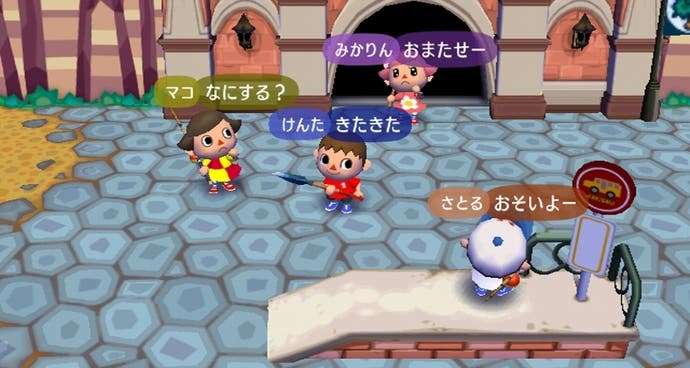Animal Crossing: Let's Go To The City
A tale of two cities.
Animal Crossing is a world without death, but that doesn't mean it's a world without loss, something that's never more keenly felt in this virtual life sim than when your in-game neighbours up and leave. As the name suggests, Animal Crossing houses a transient population, something we're not used to in games that ask us to invest in relationships, so when Tiffany, the cute cat you've been flirting with and running errands for, leaves the village on the next bus out with only a scribbled note by way of goodbye, you're actually sad.
The feeling in past Animal Crossings was heightened because while most of the residents were free to head off to new lives on a whim, you could only go to your friends' towns, and only on the DS. A town of one sort or other was where you had to stay until you grew tired of it and stopped visiting, leaving the weeds to sprout and your relationships with the other villagers to wane. Until that point you were the local constant - the hick who never left its borders - and there was some comfort in the knowledge that the places the other animals went would never be known by you.
Until now, anyway, because Let's Go To The City, the third western Animal Crossing game and first for Nintendo's Wii, punches a hole through the series' previous boundaries. Now you're free to toddle along to the bus stop at any point and catch a ride to the big smoke. Sure, all you can do when you get there is a bit of shopping and character-customisation before your inevitable ride home, but with the exception of multiplayer on the DS it's the first time players have been allowed outside the confines of a village, and it's a rare new feature in a game that otherwise exactly apes its forebears.
Indeed, for players familiar with the Animal Crossing series, much of Let's Go To The City is like watching a favourite film for the hundredth time. You smile at the right places, giggle at the worn jokes, whoop when a much-loved character pops onto screen, celebrate the triumphs and feign sadness at the micro-tragedies. It can be a joyful experience but this is joy from familiarity and not discovery. Despite the game-box promises of "new events to celebrate!" and "new items to collect!", despite the extended development time, and the community features facilitated by the Wii, and the option to play as your Mii character and, of course, the titular promise of a whole "city" to visit, there are few innovations beneath the topsoil.

Your adventure begins in the same way it always has, with a journey into a new beginning, a bus ride to a fresh start. There's no background given, no great trauma that you're fleeing from and no overarching mission driving you forward. Instead you ride in the back of a rickety bus answering the questions of a friendly co-passenger, spoken in the cutesy burbling half-tongue language of the game's inhabitants. 'Are you a boy?', 'When is your birthday?', 'Have you arranged accommodation for when you arrive in town?' The answers you give here determine your character's features, which are finally revealed when you step off the bus into your new hometown.
Moments later an officious raccoon, the local shop owner, landlord and general furry Godfather, Tom Nook, offers you one of four properties to call your own. From there in you have neighbours to get to know, letters to write, festivals to attend, fish to collect, bugs to net, fossils to excavate, clothes to buy and, of course, a mortgage to service. The game follows the Wii's internal clock and calendar, meaning that when it's night in your world it's night in Animal Crossing, while the shops open at nine and close at six, and Christmas falls on 25th December.



